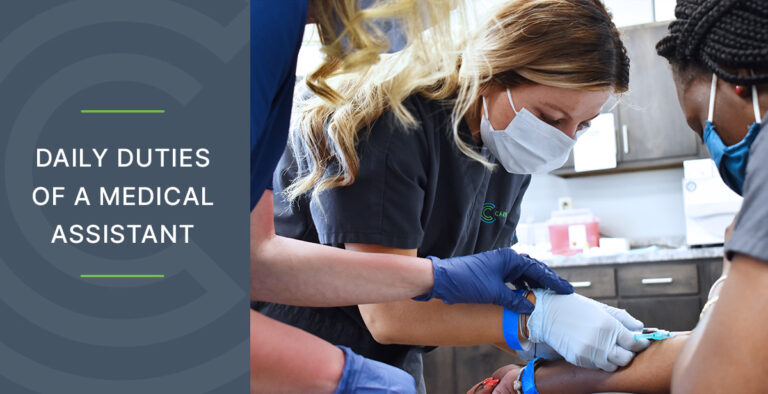Medical assistants play a vital role as the supportive backbone of medical practices of every kind. With their versatile skills and dedication, these healthcare superstars make significant contributions to the smooth operation of clinics, hospitals, doctors offices and more. Today we’re shining a light on the daily duties of a medical assistant.
Patient Care and Interaction
Medical assistants are often the first point of contact for patients and perform both clinical and administrative tasks on a routine basis. They greet patients with a warm smile, record vital signs, collect information about a patient’s medical history, educate patients and their families on post-treatment, and coordinate procedures, testing and hospital care. All while creating a comforting atmosphere and helping patients feel at ease.
Administrative Expertise
Beyond patient care, medical assistants also manage a variety of administrative tasks. They schedule appointments, update medical records, and handle billing and insurance paperwork. Having strong organizational skills can help medical assistants perform the administrative aspect of their duties, ensuring the healthcare facility runs efficiently, and enabling doctors and nurses to focus on patient care.
Assisting Medical Procedures
Medical assistants are also trained to assist healthcare providers during medical procedures or minor outpatient surgeries. From sterilizing equipment to preparing patients for examinations, they ensure that medical procedures run smoothly. This requires a meticulous attention to detail and knowledge of medical protocols to create a safe and sterile environment for patients and medical staff.
Laboratory Responsibilities
In many medical settings, medical assistants handle basic laboratory tasks. They draw blood, collect and prepare laboratory specimens, conduct basic lab tests, and ensure accurate labeling and documentation. They may also perform electrocardiography and pulmonary exams.
Medication Administration
Under the supervision of healthcare professionals, medical assistants may also prepare and administer medication orally or through injections.
How to Become a Medical Assistant
Becoming a medical assistant involves a range of requirements, which can differ from state to state. Generally, aspiring medical assistants need to complete an accredited program, which could be a diploma, certificate, or degree. These programs offer a blend of classroom instruction and practical clinical training. Many educational institutions provide onsite clinical labs, allowing students to gain hands-on experience in a real clinical environment.
Upon successful completion of their chosen program, students typically receive a diploma or certificate. Following this, they have the option to take the Registered Medical Assistant (RMA) exam, a credentialing examination administered by the American Medical Technologists. It’s important to note that while certification may not be mandatory in some states, a significant number of employers prefer hiring certified medical assistants due to their standardized knowledge and skills. This certification not only validates their expertise but also enhances their employability in the competitive healthcare job market.
How to Select the Right Medical Assisting Program
Choosing the ideal medical assisting program is a pivotal decision that shapes your future in healthcare. To find the best fit for you, consider several key factors.
- Ensure the program you’re considering is properly accredited.
- Evaluate the curriculum thoroughly, looking for a balance between comprehensive classroom learning and hands-on clinical experience. A program with a well-equipped onsite clinical lab provides invaluable practical training.
- Research the faculty – experienced, knowledgeable instructors can significantly enhance your learning experience.
- Assess the program’s support services, including career counseling and job placement assistance, which can ease your transition from student to professional.
- Consider the program’s flexibility, including class schedules and online learning options, to align with your lifestyle and commitments.
- Look for accelerated programs that can put you in the workforce faster.
By weighing these factors thoughtfully, you’ll be able to confidently choose a medical assisting program that not only meets your educational needs but also empowers you for a successful and fulfilling career in healthcare.
If you’ve got a genuine desire to impact lives while you build a stable career, medical assisting could be your perfect calling. The entire healthcare community relies on the unique blend of skills and empathy that medical assistants bring to their roles each day. A career in medical assisting offers not only fulfillment but also constant challenges, ensuring you’ll never be bored and are likely to always find meaningful work. If you’re interested in exploring a career as a medical assistant, check out the medical assisting program at Caris College. Featuring a hands-on externship and an accelerated 10-month curriculum, Caris College equips students with the necessary training to embark on a journey in the medical assisting field. Reach out to us today to discover more or simply fill out the form below, and we’ll be in touch to guide you further.
